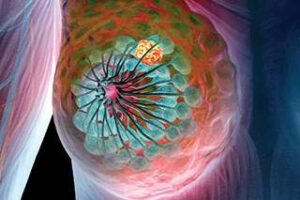

An Irish research team, Breast-Predict, is confident that it has achieved a breakthrough in the fight against Triple-negative Breast Cancer (TNBC). The team is based in St. Vincent’s Hospital in Dublin.
TNBC accounts for about 15% of all breast cancer diagnoses, but has the highest mortality rate due to a lack of truly effective treatment.
The team believes that compound APR-246 can be used to treat TNBC effectively.
TNBC differs from other subtypes in that it does not express estrogen receptor (ER), progesterone receptor (PR) or the amplification of Her2/neu. Since most chemotherapy drugs target one of these three molecular markers, the medical armamentarium in the fight against aggressive breast cancer is severely limited.
Patients diagnosed with TNBC usually undergo chemotherapy, but the disease does not respond well to treatment in many cases, since the targeted receptors are missing. As a result, most patients face a poor outcome.
Crucially, the vast majority of TNBC cases feature a mutated P53 gene, which makes it a target of interest for treatment.
A mutation in P53 renders it ineffective in enabling the DNA damage response pathway, which allows the survival of incipient tumour cells.
APR-246’s mechanism of action targets the aberrant P53 gene, ‘correcting’ its mutation and thus inhibiting tumour progression.
The compound will undergo clinical trials to determine its long-term viability.
Dr Robert O’Connor, Head of Research at the Irish Cancer Society, has welcomed the development and said that “These research programmes focus on finding new ways to prevent as many cancers as we can, ensuring the most advanced personalised treatment options are available and that as many patients as possible thrive after their treatment.”
“The number of people with cancer in Ireland is expected to double by 2040, and more research is vital if to tackle this growing epidemic of cancer.”


